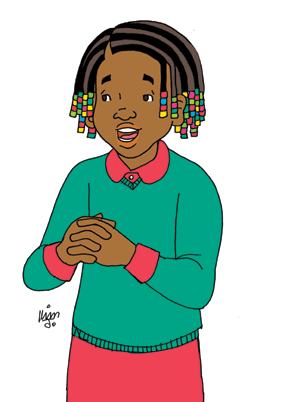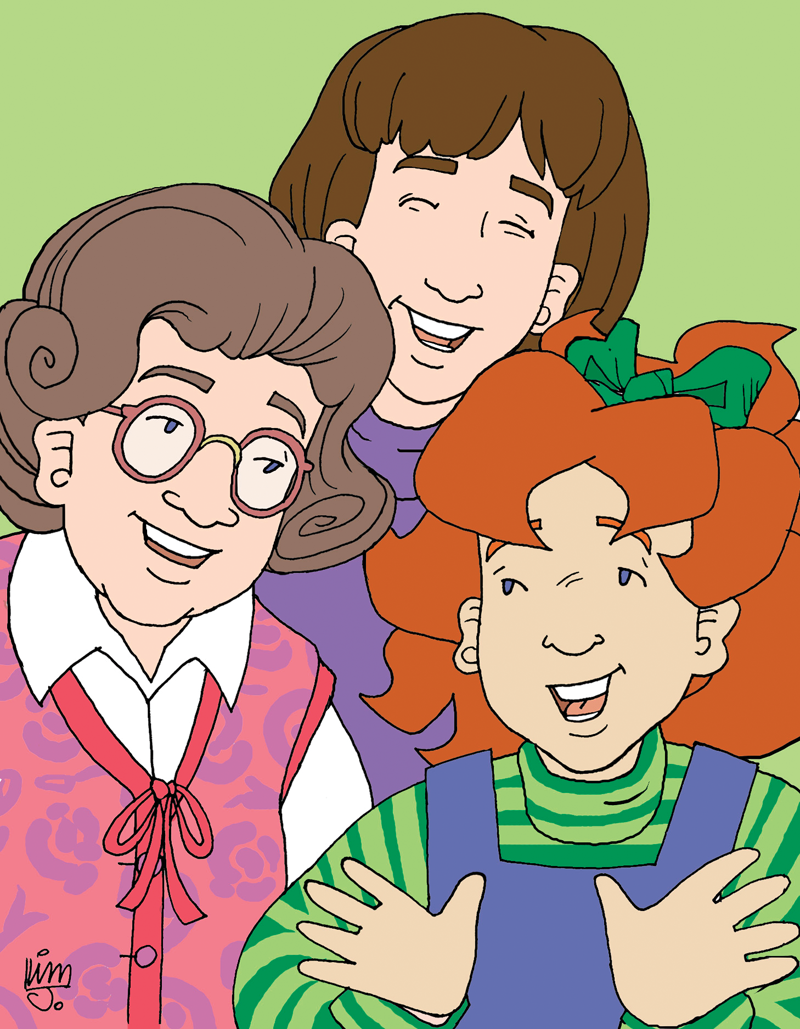
By Debbonnaire Kovacs
Michael Arthur Patterson raised his hand. The Primary class was discussing their Christmas program, and he had an idea.
“Yes, Mike?” Ms. Kimoto said.
“We could have a musical program with a lot of Christmas songs. I could even play ‘Silent Night’ on my recorder. I know it already, because I’ve been practicing it.”
“That’s a good idea,” Kenya agreed. “People like to hear us sing. We like to sing too!”
“We’ll be just like the angels at Bethlehem,” Susannah pointed out.
“Well, maybe not quite that good!” Mike said with a laugh.
“Some of our songs could be ones that everybody knows and can sing with us, and some could be new ones,” Solly suggested.
“But we don’t know any new Christmas songs,” Matt objected.
“I know a cool one my grandma sings,” Kenya said. “It’s really old, but I don’t think most people know it. It’s called ‘Sweet Little Jesus Boy.’ Grandma says it’s a Negro spiritual.”
“What’s that?” Matt asked.
“It’s a song the African people made up when they were slaves,” Kenya explained.
“How does it go?” Solly asked.
Kenya sang for them.
“Sweet little Jesus Boy, they made You be born in a manger.
“Sweet little holy Child, we didn’t know who You were.
“Didn’t know You’d come to save us, Lord, to take our sins away,
“Our eyes were blind—we couldn’t see—
“We didn’t know it was you.”
“That’s really pretty!” Susannah exclaimed.
“It makes you think, doesn’t it?” Kenya said. “People never would have treated Jesus the way they did if they had known who He was. There are more verses, but I don’t know them all. There’s a part in the song I really like, that says, ‘Please, sir, forgive us, Lord. We didn’t know it was You.’ I think it’s cool, calling Jesus ‘sir.’”
“The African slaves wrote that?” Mike asked
“Yes,” Kenya said. “Grandma says lots of them could only survive the terrible times because of their faith in God.”
Mike caught his breath. He had another idea. A great, super, awesome idea! “Ms. Kimoto! What if we all choose songs from our nationality? Like, Kenya has this African-American one, and you could teach us a Japanese one, and—and do you know an Arabic one, Solly?”
“Yes, I do!” Solly said excitedly. “I think that’s a really cool idea! Christmas around the world!”
“That’s a good name for it. We’ll put that in the program,” Ms. Kimoto said. “What is your Arabic song, Solly?”
“It’s called ‘Lailatal-Milad.’” He laughed at the expressions on their faces, and added, “In the night of the birth. It goes like this:
“In the night of the birth, hatred is erased,
“In the night of the birth, earth shall bloom forth,
“In the night of the birth, war shall be buried,
“In the night of the birth, love shall fill our hearts.”
There was silence for a moment. “There have been wars in Arab countries practically forever,” Solly said sadly, “so even at Christmas, people sing about the end of war.”
“Well, that’s a great thing to sing about,” Mike pointed out. “Jesus came so we wouldn’t have war anymore.”
Matt turned to Susannah. “What are we?”
“Mostly Irish, I think. Are there any Irish Christmas carols?” Susannah thought hard. “I know! Mom’s great-grandmother was French. How about ‘Bring a Torch, Jeanette, Isabella?’ I don’t know if I remember all the words.”
“I know it. I’ll help you,” Ms. Kimoto offered. So Susannah and the teacher sang,
“Bring a torch, Jeanette, Isabella, bring a torch, come swiftly and run.
“Christ is born, tell the folk of the village, Jesus is sleeping in His cradle.
“Ah, ah! Beautiful is the mother. Ah, ah! Beautiful is her Son!”
“Wouldn’t it have been exciting to have been a kid in Bethlehem that night?” Kenya asked eagerly. “I would have run from door to door and told people, ‘The Messiah is born! He’s here!’”
“Do you think they would have listened?” Solly asked.
“I’d sure try to make them listen!” Kenya declared.
“Well, that’s kind of what we’re doing,” Mike pointed out. “When we sing Christmas songs, we’re telling people He came. Some of them really listen. I hope.”
“Anyway, that song won’t be too hard to learn, because we already kind of know it,” Susannah said. “We don’t have a lot of time to learn new songs. What about a Japanese one, Ms. Kimoto?”
“I know one that should be fairly easy to learn. In Japanese it is called ‘Hitsuji wa Nemureri,’ and it goes like this:
“Sheep fast asleep, there on a hill, grass for their bed, all is still.
“Cold winter night, the frost appears, shepherds keep watch by their fire.
“Soft there a sound, far, far away. Is it the stream? Winds at play?
“Nay, friends, it is the heavenly choir, ringing throughout the spheres.”
“That’s beautiful!” Kenya and Susannah said at the same time.
“We could learn that.” Susannah looked around the group and counted on her fingers. “Japanese, Arabic, African -American, French . . . what about you, Mike? This was your idea!”
“Yes, what about ‘Silent Night?’” Ms. Kimoto asked. “I liked the idea of your playing that on your recorder.”
Mike grinned. “That’s perfect! It’s German, and my mom’s grandfather was from Germany!”
Everybody laughed, and together they all sang,
“Silent night, holy night, all is calm, all is bright
“Round yon virgin mother and child,
“Holy infant so tender and mild,
“Sleep in heavenly peace, sleep in heavenly peace.”





